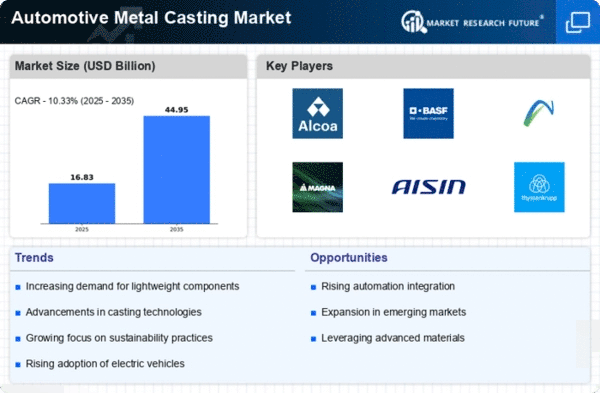Top Industry Leaders in the Automotive Metal Casting Market

Automotive Metal Casting Market
The automotive metal casting market is where molten metal meets automotive muscle. Here, sparks fly and innovation roars as giants clash and nimble contenders vie for market share. But this isn't just a battle of brute force; it's a strategic dance of precision, efficiency, and adaptability. Let's delve into the fiery strategies employed, the factors shaping dominance, and the recent developments keeping this market hot.
Strategies Shaping the Casting Crucible:
-
Technological Prowess: Leading players like Nemak and Benteler Automotive are pushing boundaries with advanced casting techniques like lost-core casting, 3D sand printing, and high-pressure aluminum casting. Think lighter, stronger components with intricate designs and reduced waste. -
Lightweighting Focus: Driven by fuel efficiency regulations and sustainability demands, companies like Magna International and CIE Automotive are specializing in lightweight magnesium and aluminum castings, replacing heavier steel components. -
Vertical Integration and Automation: To ensure quality and control, giants like Ford and General Motors are investing in vertical integration, establishing their own casting facilities and deploying automated robots for faster, more precise casting processes. -
Sustainability Drive: The green wave is washing over the market, with companies like Gestamp and Thyssenkrupp adopting recycled materials, reducing energy consumption, and exploring cleaner casting technologies. -
Focus on Niche Markets: Catering to specific needs, companies like Mando Corporation and CIE Automotive are carving niches in electric vehicle (EV) castings and high-performance engine components.
Factors Influencing Market Share:
-
Cost Efficiency and Productivity: Optimizing production processes for speed, minimal waste, and lower costs is key for success in a price-sensitive market. -
Quality and Reliability: Flawless castings with consistent performance are crucial for securing long-term contracts with automakers. -
Technological Expertise and Innovation: Demonstrating cutting-edge casting techniques and a commitment to R&D attracts premium contracts and builds trust. -
Geographical Footprint and Reach: Having a global presence and established partnerships with automakers in key regions like Asia Pacific and Europe is a significant advantage. -
Environmental Footprint and Sustainability: Implementing green practices and offering eco-friendly casting solutions resonates with environmentally conscious consumers and automakers.
Key Players:
Nemak (Mexico), Ryobi Limited (Japan), Rheinmetall Automotive (Germany), GF Automotive (Switzerland), Ahresty Corporation (Japan), and Dynacast (U.S.)
Recent Developments:
August 2023: Ford announces a $1 billion investment in its Dearborn casting facility to upgrade to sustainable and lightweight aluminum casting technologies.
September 2023: Nemak partners with a leading EV startup to develop and manufacture high-performance battery casings for their new electric vehicle model.
October 2023: Benteler Automotive unveils a revolutionary 3D sand printing technology for complex engine components, reducing weight and boosting fuel efficiency.
November 2023: The International Aluminium Castings Association (IACA) hosts a global conference showcasing the latest advancements in sustainable and lightweight automotive casting.
December 2023: Gestamp announces a partnership with a renewable energy company to establish a carbon-neutral casting plant, leading the charge towards greener production.
January 2024: The European Union implements stricter regulations on automotive emissions, further pushing automakers and casting companies to adopt lightweight and sustainable solutions.










